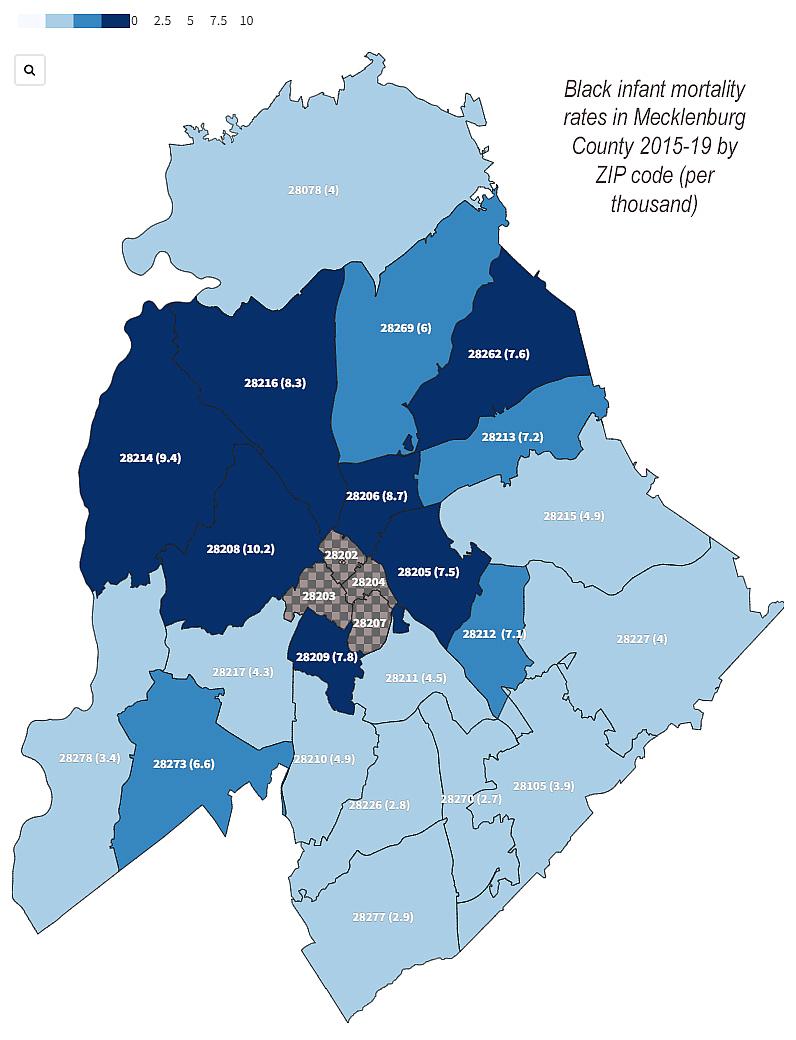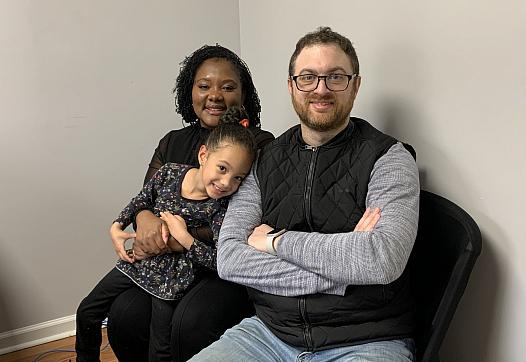Black babies more at risk of early death in Mecklenburg
The story was originally published in The Charlotte Post with support from the 2022 Data Fellowship.

Shakira and Steven Balerna with daughter Sienna in February. Two years ago, Shakira and Steve’s second child, Halle, died a day after birth due to placental abruption that deprived her of oxygen.
AALIYAH BOWDEN
First in a series.
Black babies are more likely to die in Mecklenburg County than anywhere in North Carolina.
According to 2021 data from the county health department – the most recent year data is available – with the infant mortality rate at 8.6 for Black infants per 1,000 births compared to their white counterparts at 3.5. Infant mortality is the death of a child before his or her first birthday according to the U.S. Centers for Disease Control and Prevention.
Two years ago, Shakira and Steven Balerna of Charlotte were excited to be expecting their second child, a girl. Shakira had a normal pregnancy, made her appointments regularly, and showed no signs of concern.
“We were really excited to add that second addition to our family, everything we planned on having like the first two years apart,” said Shakira, 36, who has a 4-year-old daughter. “It was working out good. The pregnancy was really good. It was very easy. It was very [eventful] until the end.”
Towards the end of her pregnancy, Shakira began experiencing Braxton Hicks contractions and lower belly discomfort. At her last doctor appointment, Shakira said her gynecologist had trouble finding the baby’s heartbeat but eventually did.
One night before she went to bed, Shakira knew something wasn’t right.
“I noticed that she wasn't moving as often as she usually did,” she said. “I would turn from side to side and I noticed that she flopped kind of easily.”
Shakira was 36 weeks pregnant at the time.
She went to Novant Health Presbyterian Hospital the morning of June 29, 2021. An ultrasound revealed a heartbeat, but in less than 10 minutes, a nurse noticed the baby’s heart rate began to drop rapidly. Doctors immediately performed an emergency C-section.
Shakira had a concealed placental abruption, in which blood is trapped between the placenta and uterine wall, causing little to no vaginal bleeding during delivery. According to the Mayo Clinic, this condition can decrease or block the baby’s supply of oxygen and nutrients.
Baby Halle was born around 1 a.m., and doctors needed 18 minutes to resuscitate her.
With the baby going without oxygen for so long, she developed a series of complications and was placed on life support. Halle died June 30.
In 2020, the Tar Heel State ranked eighth in infant mortality in the U.S., according to the North Carolina Child Fatality Task Force. That year, 75 babies died in Mecklenburg County with an infant mortality rate of 5.1, according to the North Carolina State Center for Health Statistics
Among them, 46 were Black, 18 white, five were Hispanic, and six of other races. North Carolina’s population is 22% Black.
“We've seen declines in Black and white communities and other communities as well, but we haven't seen that gap close,” said Mecklenburg County Public Health Director Dr. Raynard Washington.
In 2021, 56 Black infants died in Mecklenburg with a rate of 8.6 making up 45% of infant deaths in the county that same year. There were a total of 13 undetermined cases, with 11 Black babies who died from unknown causes.
The number one cause of death in Black babies were conditions that originated a couple of weeks before or after birth.
For instance, birth trauma and injuries, abnormal findings on neonatal screenings, disorders of newborn gestation and fetal growth, infections, along with other conditions.
As of 2020, premature and low birth weights are the number one cause of death among Black babies in the state, according to the North Carolina State Center for Health Statistics. From 2011 to 2021, the infant mortality rate in Mecklenburg County has decreased by 21% but Black infant deaths are almost two and half times higher than whites.
Not all infant deaths are connected to birth, however.
For instance, a baby can die accidentally by suffocation or from unsafe sleeping conditions.Based on interviews with health experts, there is no simple answer as to why more babies of color are dying, let alone the rate of Black women dying after giving birth.
Sometimes it can be preexisting conditions that put moms at risk. Other times, there is no explanation why.
“Prematurity [birth] rates are higher for African American women,” said Dr. Tiffany Jones, a gynecologist at Novant Health in Charlotte. “Some of that is hypertensive disorders, the weight of mom, whether it be low or high. Some of that can be eating habits. Some of that could be tobacco use. It could be any other things that can contribute to that. And then there's the other bucket that we don't really know why it just kind of happened.”
A 2018 study by Duke University researchers investigated whether Black pregnant women were at a disadvantage compared to white pregnant women when it came to age and education.
“So even when we talk about the supposed time that Black women are supposed to be at their safest … you're still seeing the same high numbers that are much higher than it is for white women and some other groups as well,” said Dr. Keisha Bentley-Edwards, associate professor of general internal medicine at Duke.
Researchers found that Black women have a greater chance of infant mortality at every age during their reproductive years. Even Black women with doctorate and professional degrees are more at-risk than white women who never finished high school.
According to the study, there is “no safe age for Black women to have children.”
Researchers found that racism can contribute to poor outcomes, such as stressors from living in predominantly white neighborhoods or isolation in high-status occupations can contribute to inflammation and hormonal changes that lead to problem pregnancies.
“The type of surveillance that occurs for Black people who are in predominantly white neighborhoods has an effect on your stress level,” Bentley-Edwards said.
According to the Duke study, there is a “strong tendency” to attribute racial disparities to the problem. For instance, obesity, alcohol and drug use; lack of prenatal care and health insurance, as well as a mother’s age, diet, and health prior to conception.

However, researchers point out that the “greater vulnerability of Black infants cannot be explained by these factors” alone.
“One of the things that we really wanted to do was to bust myths because there were so many perceptions about why these numbers exist and a lot of it was really putting it on Black women,” Bentley-Edwards said.
“[For instance], Black women just don't take care of themselves or it's what Black women are doing to cause these numbers, rather than what's going on in society to Black women and to their babies.”
About 67% of Black residents in Mecklenburg County received prenatal care during their first trimester in 2020 compared to 81% for whites, according to state data.
Access may be challenging because of doctor availability, insurance status, and time off work.
“It's really unique to Mecklenburg County that we have our care managers sitting in every OB-GYN practice in the community,” Washington said. “As women come in, they can catch them and help them to navigate the system that I know that they can. That's a team of nurses and social workers who sit in those practices and their health department employees.”
The North Carolina Department of Health and Human Services is addressing maternal health by implementing the 2022-2026 Perinatal Health Strategic Plan to save more moms and babies.
“Strengthening our focus on infant and maternal health is critical to nourishing the well-being of our communities across North Carolina,” NCDHHS Senior Medical Director for Health Promotion Kelly Kimple said in October. “We are committed to the goals of the Perinatal Health Strategic Plan and ensuring people of reproductive age get the care and support they need prior to, during and after pregnancy.”
North Carolina lawmakers’ hesitancy to expand Medicaid eligibility makes prenatal care access more difficult for poor women and their unborn children.
An estimated 600,000 North Carolinians would benefit from coverage of the federally funded program, which the Republican-majority General Assembly has indicated support for, but has not implemented due to differences over eligibility rules.
In Charlotte, the nonprofit clinic Care Ring launched A Guided Journey program with the health department in 2021 to address disparities that lead to infant mortality. The initiative’s operating budget is $675,000, with funding provided by Mecklenburg County and the American Rescue Plan Act.
“That program, the newly funded program with ARPA funds from the county will also help support the training of a more diverse workforce of doulas as well here in the community,” Washington said. “We're really excited that that's on the horizon.”
AGJ provides prenatal and postpartum support and other services to mothers and connects them up to 90 days postpartum with a community health worker who will serve a family for the child's first two years.
“Community health workers are working with families to meet their social determinants of health needs,” said Tchernavia Montgomery, Care Ring’s executive director. “That might be food, transportation, housing, safety and wellbeing education.”
The two-year-old program has a capacity of 400 families annually. There are currently 298 families enrolled, with 32% of participants identifying as African American and 52% Hispanic or Latinx.In 2022, 83% of program families found a primary care provider, and 85% of women are breastfeeding their baby.
Ninety-six percent of mothers were screened for postpartum depression with 86% of the mothers completing a postpartum visit within six weeks of delivery.
“Because of the continued crisis for women of color along the maternal child health continuum, we are seeing numbers unfortunately increase as the gap widens with wealth,” Montgomery said.
After Halle died, Shakira and Steven attended a support group through the local nonprofit KinderMourn, which provides hope for bereaved parents.
“It was ongoing support,” Shakira said. “Having people that we can reach out to who can relate to us, has been really helpful.”
In August 2021, the couple attended the Empty Arms program, which offers counseling for parents who experienced the death of a baby from early pregnancy through newborn death.
“I think that helped a lot, just reminding myself that we're not alone,” Steven Balerna, 37, said.
Halle’s death inspired Shakira to start a maternity photography business. Shakira Balerna Photography shows the “beauty and power” moms have at every stage of motherhood. Balerna offers a Halle package and a Sienna package, which pays tribute to both of her daughters.
“It’s a way to keep her name and just continue to hear it and honor her through my business,” said Shakira, who announced she is pregnant with her third baby, who is due in May.

